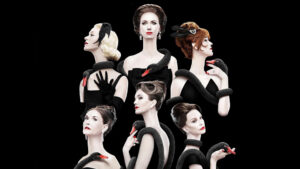
Ryan Murphy’s Feud finishes what Truman Capote started
TV Review
The Swans
WE meet Babe Paley in 1968. She’s called Truman Capote uptown to rage about her husband Bill’s latest affair — he’s screwing Happy Rockefeller, the governor’s wife. Truman (Tom Hollander) quietly surveys the crime scene and tells Babe (Naomi Watts) to calm down. “Be the great lady you are,” he whispers, urging her to get her revenge with a Van Gogh or Gauguin. Her pride is wounded, but she’ll get over it.
Indeed, she tells him, “the only person who could ever really hurt me is you.” Hurt her he will, with the gory details he gathers that very afternoon.
Feud: Capote vs. the Swans, the long-awaited sequel to 2017’s camp-tastic hit Feud: Bette and Joan, follows Capote as he blows up his world by publishing an excerpt from his never-to-be-finished novel, Answered Prayers, in Esquire in 1975. “La Côte Basque” described a gossipy lunch shared by thinly veiled versions of himself and his “swans,” the wealthy women in his circle. It aired some of their dirtiest laundry. Overnight, he was banished from high society.
In any feud — particularly a famous feud — the fight is beside the point. The grudge is the intriguing bit: why and how people can nurse a resentment until it consumes them entirely. It takes tremendous effort to never forgive someone, as Capote vs. the Swans illustrates with a brutally neat metaphor. Too proud to apologize, Capote drinks himself to death; Paley, clinging bitterly to her anger, chain-smokes her way into lung cancer.
The show offers lots of spiteful scenery along the way to this rock bottom. Capote is no mere court jester — he’s an assassin. From the moment the Paleys meet Capote, they ought to have known what they were in for. Bill Paley, the chairman of CBS (Treat Williams, in his final role), mistakenly invites the writer along on a jaunt to Jamaica in 1955. (The series does a lot of time traveling.) Soon he’s regaling them with salacious gossip about a woman in their set who he insists murdered her husband.
Slim Keith (Diane Lane), the famous ex-wife of Howard Hawks and Leland Heyward, professes shock when the story comes out in 1975, asking, “What animal in nature pretends to love you and then tries to eat you?” By that time she already knows. She’s shared hundreds of venomous lunches with him. But Capote never owns culpability. Why should he? He’s only a pet. “We’re like Pomeranians to them, aren’t we?” he tells his ex, Jack Dunphy (Joe Mantello). “There to cuddle when they need something fluffy to hold on to. But should we growl or show our teeth, then it’s off to the pound we go!”
The writer famously dodged responsibility and sailed past contradictions. Gayer than any Disney villain, he still held court at society’s highest echelons. Capote pioneered a new mode of celebrity, a sort of confessional performance art. In our Real Housewives era, the political and cultural interest of this tale is obvious. How did celebrities destroy each other before there was TikTok? At one point in Feud, Bill Paley barks at him: “Nothing’s private with you!” He sounds just like an exasperated Warren Beatty in Madonna’s 1991 documentary, Truth or Dare.
Dense as it is with cultural signifiers, the series is eerily quiet about its context, the tumultuous 1960s and ’70s. You’d never know the Vietnam War was raging and New York City going bankrupt — and oddly, considering its queer main character, Stonewall doesn’t even get mentioned. It feels as if half the show unfolds entirely inside the carefully re-created La Côte Basque, the infamous restaurant. (Did they never eat anywhere else?) We’re trapped with the swans in their rarefied confines and with Capote on his couch, drinking himself to dissolution in a mustard-colored bathrobe. Is that the point? The high and mighty really do live in their own world. Mean and shallow it may be, but the rest of us would just die for an invite.
Written by Pulitzer finalist Jon Robin Baitz and directed mostly by Oscar nominee Gus Van Sant, Capote vs. the Swans is witty, polished, beautiful — and often dull. Hollander has the lisp, the mannerisms, the drunkenness down, but the character never really travels anywhere. Watts, Lane, and Chlöe Sevigny, as the ramrod blonde C.Z. Guest, do a marvelous job channeling the spellbinding but very rigid grandeur of the swans, but it’s not enough. Jessica Lange, producer Ryan Murphy’s gothic muse, makes a campy appearance as the ghost of Capote’s mother, popping up from time to time to feed him pills and criticize his prose (“Try to make this next bit less fruity”). But even she can’t do much to raise the stakes. (The next time Ryan calls, Jessica, say no.)
The best episode by far imagines a visit from an acerbic James Baldwin (Chris Chalk), who shows up to urge Capote to really put the swans out of their misery and finish the book. He provides the series’ only overt commentary: These bigoted, grasping women Capote fawns over are the nadir of American society, not its zenith. Capote takes great pleasure dishing out the real dirt he has on them — the alcoholism, eating disorders, love affairs, estranged children — but when Baldwin goes, so does any inkling that he’ll really let it rip. He’s mean enough to humiliate his friends, but too weak — much like this series — to make it count for anything. — Bloomberg



